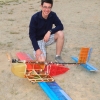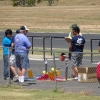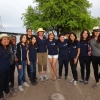Anteater Engineers Take Second Place in Design/Build/ Fly International Contest

May 13, 2015 - For the fourth straight year, UC Irvine’s Design/Build/Fly team has earned a national top-two finish. The DBF undergraduates placed second in the 19th annual AIAA Competition held in Tucson, Ariz., in April.
A partnership between the AIAA Foundation, Cessna Aircraft Company, and Raytheon Missile Systems, the annual DBF competition provides students an opportunity to design and build an unmanned, electric-powered, radio-controlled aircraft to perform specific missions. Participants who complete a letter of intent and submit a report on time are invited to bring their plane to a central location for a flyoff. Winners are determined by a combination of their report score and their flight mission score.
Of the 100 entries this year, 65 teams attended the flyoff, all of which completed the technical inspection. Fifty-six teams achieved a flight score, and 23 teams successfully completed all three missions.
The Anteater engineers entered the weekend with a strong report score and were in first place until the final mission when it was overtaken, via a controversial scoring method, by University of Ljubljana, Slovenia. It was the first time an international team has won the competition. Georgia Institute of Technology took third place.
This year’s theme was a remote sensor delivery and drop system. UCI’s 38-member team designed an airplane that could carry an externally deployed sensor payload (two softball-sized whiffle balls) and 5-pound internal cargo (three wood planks). With the internal cargo, the plane’s maximum takeoff weight was just over 8 pounds.
Following a designated course, the first mission was a ferry flight with no cargo to see how many laps each team could fly in four minutes. The second mission was a three-lap timed transport mission with the internal cargo. The third mission was a sensor drop mission in which one whiffle ball per lap was dropped at a designated region of the course. The fourth mission was a timed ground-loading mission to see how fast the two different payloads could be loaded on the airplane.
This year’s competition posed a couple of design constraints. One was the short take off length of 60 feet and the other was that the overall score was divided by the number of servomechanisms (actuators that allow the pilot to control the airplane and release the cargo). This required the team to develop mechanisms to perform multiple functions with a limited number of servos. The plane’s weight is also a factor. The empty weight of the airplane always divides the scores, so there is a large push to remove even fractions of an ounce of weight.
“UCI had one of the airplanes with the fewest number of servos,” says Colin Sledge, graduate student adviser. “USC tried to do it with one less servo, but it proved to be too hard to control and they continued to crash.”
The fourth mission was the basis of the controversy. The UCI team had a very strong report score and was in first place for the entire weekend. On Sunday afternoon, it looked as if UCI was going to win, and the Ljubljana team would place second. However the Ljubljana team’s loading time was fast for the payload. If the judges had used raw scores, UCI would have placed first. The controversy arose when the judges rounded up UCI’s score and rounded down Ljubljana’s score.
“It was frustrating, but we are proud of how well we did,” says Michael Lau, a mechanical engineering major and co-project manager who has been involved with DBF the past four years.
Lau and co-project manager Jocelyn Pedroza explained that four days before they left for the competition, they conducted a test flight with the DBF plane and it crashed. The team had to rebuild in four days in order to make the trip. “It was pretty stressful,” says Pedroza, and aerospace engineering major.
The team’s adviser, Professor Robert Liebeck, a National Academy of Engineering member and a world-renowned authority in the fields of aerodynamics, hydrodynamics and aircraft design, said that “changing the scoring algorithm that moved UCI to second place on the last day was indeed disappointing. When I challenged the official who created the change, he remarked that he was puzzled that second instead of first place was of such importance. Apparently he has never participated in a sport. Regardless, I told our UCI DBF team that they won.”




